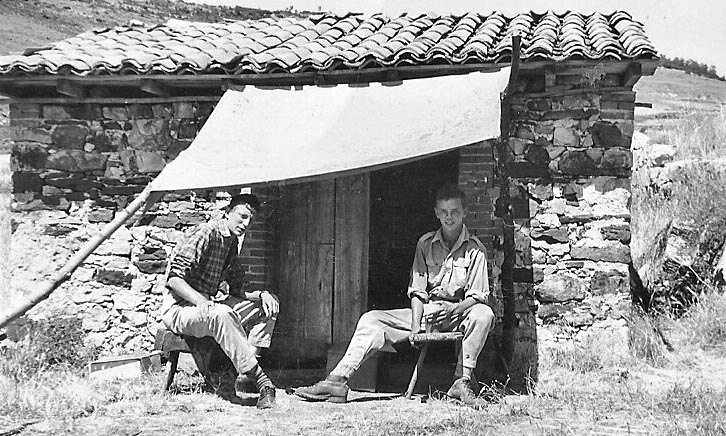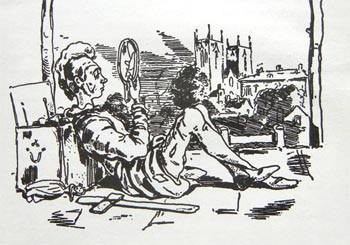|
Biographical Log of Michael Furstner - Page 274
11 | 12 ||
2012 :
Jan |
Feb |
Mar |
Apr |
May |
Jun |
Jul |
Aug |
Sep |
Oct |
Nov |
Dec || Page :
Previous |
Next
Martinshof Story -
Happiness -
Awareness -
Black Forest walks -
Camino -
Dolmen Tour -
Travel
Most Recent -
Next -
Previous -
Page 1 -
Photos -
Maps & Articles -
MP3s -
Jazclass
Thursday - Monday, February 21 - 25 2013
(diary)
 We have a saying in Dutch I on many occasions wanted to translate
and say in English, but could not, because nobody could tell me
the name for the part hanging inside a bell.
We have a saying in Dutch I on many occasions wanted to translate
and say in English, but could not, because nobody could tell me
the name for the part hanging inside a bell.
"Hij heeft de bel horen luiden maar
weet niet waar de klepel hangt."
Finally, last week, with the aide of one of Doug's (my son-in-law)
illustrated dictionaries, the mystery has been resolved : a
clapper.
"He has heard the bell ringing
but does not know where the clapper hangs."
Meaning : he does not understand a thing about it !
Immediately on finding adjacent sketch a typical English expression
also revealed its origin to us : "he was
running like the clappers."
Through the writings in my Blog I sometimes get the most
unexpected contacts, like two weeks ago for example.
 In the summer of 1958 I and a friend (Hauk Fischer) spent 6 weeks
in the tiny village of Felechas
(Asturias, Northern Spain), mapping the geology of the surrounding
area for our studies in Geology. Two years ago I wrote a couple of
short stories about my experiences there as part of my Memories from Spain (stories 8 and 12).
In the summer of 1958 I and a friend (Hauk Fischer) spent 6 weeks
in the tiny village of Felechas
(Asturias, Northern Spain), mapping the geology of the surrounding
area for our studies in Geology. Two years ago I wrote a couple of
short stories about my experiences there as part of my Memories from Spain (stories 8 and 12).
Two weeks ago I was contacted by Yosune, one of the residents of
Felechas, who had read my articles. "Miguel,
the people here still remember you, still talk about your stay in
Felechas." : 55 years after we have left !
Felechas was (and still is) a tiny village, located a few hundred
meters off the then dirt road between Sabero and Boñar. Main
traffic on the road was from trucks carting coal from the
nearby mines South of the road.
One of the truckies, Ossany, gave me a lift on my first day
when approaching Felechas, and he did this several times after,
whenever he passed us on the road. Ossany invited me for lunch with
his family one day at their home in Boñar and later bought
his own truck, carting goods throughout Spain.
The coal mines
have long been closed now Yosune tells me.

In the summer of 1958 I traveled to Felechas a week ahead of my
friend Hauk to set up camp in the village. Every evening I went to the local Pub
to meet the inhabitants and explain what we were planning to do there.
I
showed them my topographical map of the area and they were both
surprised and delighted to see the name of their village "Felechas"
printed on the map. They had never seen their village's name printed on any document ever before. My self-winding wrist watch too, a recent invention
in those days, attracted much interest and amazement.
Yosune is from a younger generation and was not born yet when we stayed in Felechas, but several of our acquaintances, like the wife of Julio the local grocery shop owner, are still alive and well.
Yosune has a house in Felechas
but presently lives in Barcelona. She promised to show me
around town next year when I hope to visit the Costa Brava, doing a
week-long walk there with Walks in Spain in September/October 2014. We
are both looking forward to that. I have also been invited to revisit Felechas itself, but that will probably have to wait until a later visit to Europe.
Most Recent -
Next -
Previous -
Page 1 -
Photos -
Maps & Articles -
MP3s -
Jazclass
Tuesday - Thursday, February 26 - 28 2013
(diary)
 William Makepiece Thackeray's Vanity Fair is a light-hearted boisterous romp of a read, but underneath hides a more
serious side of the author which here and there comes to the
surface :
William Makepiece Thackeray's Vanity Fair is a light-hearted boisterous romp of a read, but underneath hides a more
serious side of the author which here and there comes to the
surface :
"The world is a looking-glass, and gives
back to every man the reflection of his own face.
Frown at it,
and it will in turn look sourly upon you, laugh at it and with it,
and it is a jolly, kind companion; so let all young persons take
their choice."
Thackeray as a young man went to Paris and tried his luck
as a painter before getting into writing. This is one of his
illustrations for his book.
A common Dutch proverb flows on from Thakeray's observation :
"Wie goed doet, goed
ontmoet."
Meaning "Who does good will encounter
good."
The Dutch are renown for their sometimes blunt comments and
observations, which show little regard for the feelings of the
listener(s). Even after living almost 50 years in Australia my
Dutch nature slips out now and then, and I have to remind myself :
"Be nice Michael, keep your mouth shut."
I try to do my
best, but it still does not come easily to me. Perhaps this is why
I enjoy visiting Southern Germany so much. The polite and
mellower attitudes of the Germans there help me to tone down my
much sharper Dutch nature and blend in with their social and
emotional environment.
(Could it be that these differences in nature are at least in part a reflection of the two markedly different physical environments : the cold, flat landscapes of Holland versus the mystical fairytale woods of the Black Forest ?)
Speaking the German language for me personally is like
changing my nature. Charlemagne was so right when he
pronounced : Speaking another language is
like possessing another soul !"
Comments -
Most Recent -
Next Page -
Previous -
Top -
Page 1 -
Photos -
Maps & Articles -
MP3s -
Jazclass
© 2013 Michael Furstner
|

 We have a saying in Dutch I on many occasions wanted to translate
and say in English, but could not, because nobody could tell me
the name for the part hanging inside a bell.
We have a saying in Dutch I on many occasions wanted to translate
and say in English, but could not, because nobody could tell me
the name for the part hanging inside a bell.
 William Makepiece Thackeray's Vanity Fair is a light-hearted boisterous romp of a read, but underneath hides a more
serious side of the author which here and there comes to the
surface :
William Makepiece Thackeray's Vanity Fair is a light-hearted boisterous romp of a read, but underneath hides a more
serious side of the author which here and there comes to the
surface :